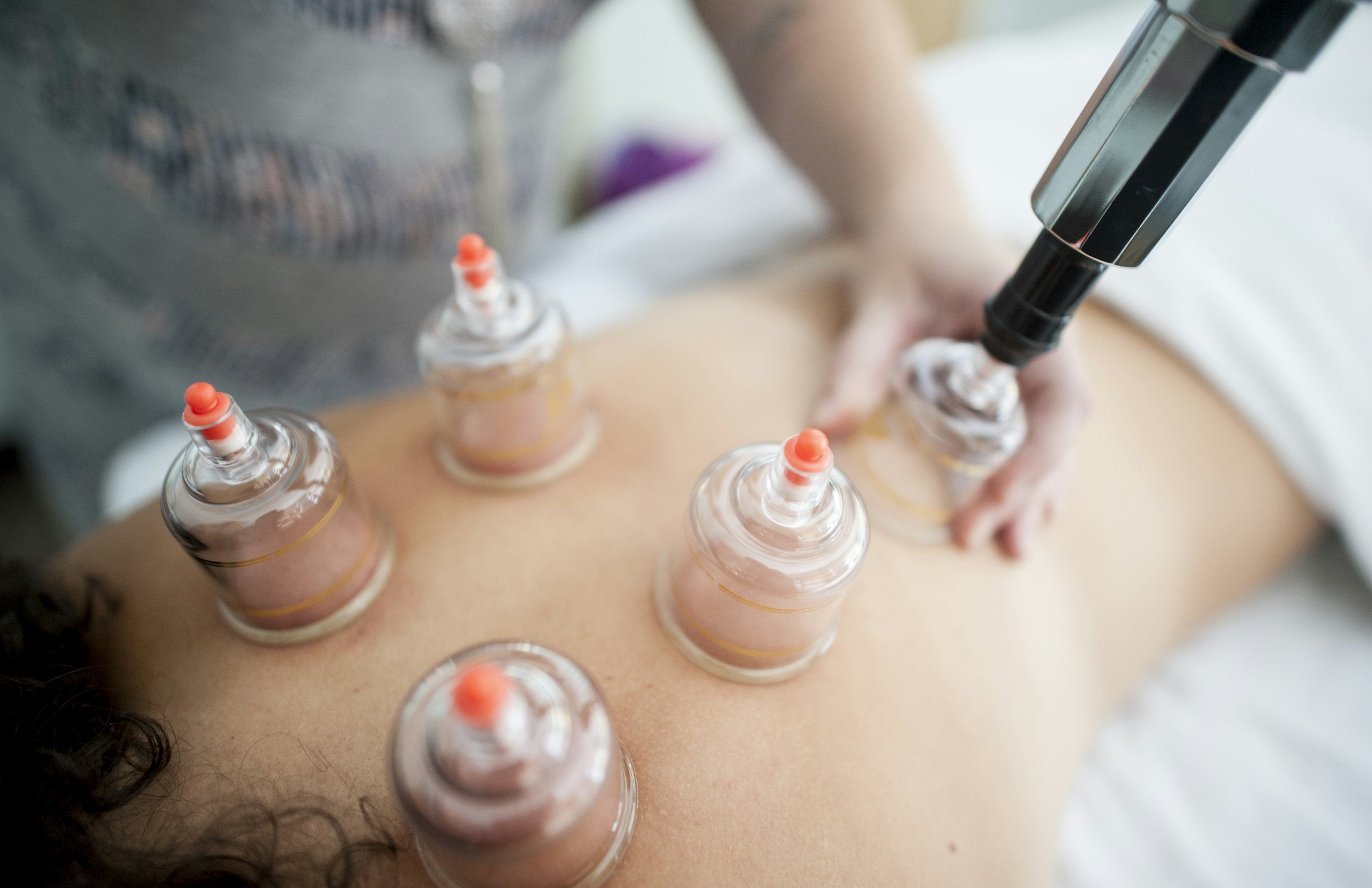
Emotional Release During Acupuncture: A Powerful Healing Tool
Acupuncture can trigger emotional releases. By stimulating specific points on the body, acupuncture influences the release of neurotransmitters that regulate mood and emotions. This can lead to emotional healing, stress reduction, improved mood, and self-discovery. If you're considering acupuncture, be open to emotional releases and create a safe environment for your session.

Understanding How Acupuncture Can Help with Fibromyalgia
Acupuncture can help alleviate fibromyalgia symptoms like pain, sleep disturbances, and stress. It promotes relaxation, improves circulation, and offers personalized treatment. While not a cure, acupuncture can significantly enhance quality of life for those with fibromyalgia.

Acupuncture and Neurological Disorders: A Promising Approach
Acupuncture can offer relief for neurological conditions like Parkinson's, MS, and migraines. It helps with pain, improves mobility, reduces spasticity, and enhances neurotransmitter balance. Acupuncture also promotes relaxation and offers personalized treatment, making it a valuable complementary therapy for those with neurological disorders.

Gua Sha: A Holistic Approach to Healing
Gua Sha, an ancient Chinese practice, offers various health benefits. By improving blood flow, reducing inflammation, and stimulating acupressure points, Gua Sha can alleviate pain, promote healing, and enhance overall well-being.

The Role of Acupuncture in Sports Therapy
Acupuncture for Athletes
Acupuncture can benefit athletes by:
Reducing pain
Accelerating recovery
Relaxing muscles
Enhancing performance
Preventing injuries
Reducing stress
Acupuncture is a valuable tool for athletes seeking holistic health and performance optimization.

Nourishing Your Way to Recovery: Foods to Avoid When Sick
When you’re sick, what you eat matters. Avoid cold, raw, dairy, spicy, greasy, and sugary foods. Instead, opt for warm soups, steamed vegetables, herbal teas, and whole grains to support your body's healing process.

Auricular Therapy: A Needle-Free Approach to Healing
Auricular therapy offers a needle-free alternative to traditional acupuncture. By stimulating specific points on the ear, this gentle practice can alleviate pain, reduce stress, improve sleep, and support digestive health.

Cupping: An Ancient Practice for Modern Wellness
Cupping is an ancient Chinese healing technique that involves placing cups on the skin to create suction. This practice can improve blood flow, reduce pain, and promote relaxation. There are two main types of cupping: dry and moving. Cupping can help with pain relief, stress reduction, and immune support. When performed by a qualified practitioner, cupping is generally safe. If you're interested in trying cupping, consult with Dr. Amanda The Acupuncture Point (TAP) South Bay.

The Power of the First Bite: Nutrition according to Chinese Medicine
A balanced diet is key to good health. Acupuncture can complement a healthy diet by improving digestion, balancing energy, and reducing stress. Starting your day with a warm, savory breakfast can also boost metabolism. By combining acupuncture and good nutrition, you can optimize your overall well-being.

Acupuncture: Unlock Your Body's Healing Potential
Acupuncture is an ancient Chinese medical practice that involves the insertion of thin needles into specific points on the body. The goal is to promote healing and restore balance to the body's vital energy, known as qi. It has been shown to be effective for a wide range of conditions, including pain relief, stress reduction, digestive disorders, women's health, mental health, men's health, neurological disorders, and chemotherapy support.

Unlocking the Secrets of Fascia: A Deeper Dive into Acupuncture
Fascia: The Body's Hidden Network
Fascia is the connective tissue that holds our bodies together. It affects movement, pain, and energy flow. When fascia is unhealthy, it can cause pain, stiffness, and limited mobility. Acupuncture can help release tension, improve mobility, and balance energy.

Boosting Energy Naturally: Acupuncture for Fatigue
Dragging through your day? Acupuncture can rebalance your energy, like recharging a battery. Specific points wake up sluggish systems and calm nerves. Patients often feel 'alive again' after a session. Unlike caffeine's jitters, it's a steady, natural boost. Pair it with good sleep and hydration for optimal results. If fatigue's got you down, consider trying acupuncture for a natural lift."

The Beginner’s Guide to Your First Acupuncture Session
New to acupuncture? Don't worry! Before your session, eat a light snack and wear loose clothes. During, we'll chat about your needs, then gently insert thin needles. You'll relax for 20-30 minutes. After, hydrate and take it easy. It's safe, tailored, and most find it relaxing. Nervous? We'll guide you.

Acupuncture vs. Other Therapies: What Sets It Apart?
Massage relaxes, chiropractic aligns, meds ease pain—but acupuncture? It’s a gentle, whole-body tune-up, balancing your energy pathways to tackle issues like migraines or PMS, no side effects for most. I love how it complements other therapies too, and it’s a joy referring patients to the perfect mix—whether it’s acupuncture alone or teamed up with other care. Curious how it fits for you? Let’s explore together!

Seasonal Wellness: Acupuncture's Winter Embrace
Winter's chill brings sniffles and sluggishness, but acupuncture offers a natural defense. It boosts immunity by activating white blood cells, perfect for warding off colds. Targeted points clear congestion and warm the body, easing winter's discomforts. Energy dips and joint stiffness? Acupuncture restores Qi flow, revitalizing and relieving pain. Pair treatments with warm broth and cozy layers for optimal winter health. Embrace the season with vitality, not just survival. Let acupuncture help you thrive.

Acupuncture for Stress: Beyond the Surface of Relaxation
Feeling frazzled? Acupuncture goes beyond surface calm. It activates your 'rest and digest' nervous system, lowering stress hormones like cortisol. Needles stimulate nerves, impacting brain chemistry and releasing tension. Think endorphins, serotonin, and a physical unwinding. Many report a 'reset' feeling, a deeper calm than a spa day. It's about rewiring your body's stress response, not just temporary relief. Combine with breathing or mindfulness for amplified benefits. Ready to trade tension for lasting calm?

A Day in the Life of an Acupuncturist
Tea, patient charts, then the day begins. Knee pain eased, stress melted away with gentle needles. Peaceful snores fill the room. Research between sessions, then the best part: 'I feel so much better.' Quiet, rewarding work. Curious? Step into our day.

Unveiling the Science Behind Acupuncture
For centuries, acupuncture has stood as a testament to traditional healing, yet often faced skepticism in the light of modern science. But the tides are turning. Recent research, spearheaded by institutions like the NIH, unveils the tangible biological mechanisms at play. Forget mysticism; we're talking endorphin release—nature's own painkillers—and increased blood flow, fueling healing at the cellular level. MRI scans reveal acupuncture's profound impact on neural pathways, literally 'rewiring' how the brain processes pain. And it's not just pain: the WHO recognizes its efficacy for conditions from arthritis to anxiety, grounded in extensive clinical trials. Acupuncture influences the HPA axis, regulating stress hormones like cortisol, and modulates neurotransmitters crucial for mood. At our clinic, we bridge this scientific understanding with ancient wisdom, offering a holistic approach. It's more than needles; it's a deep dive into the body's intricate healing processes. Join us, and let's explore the science behind this transformative practice.

Escape the Sleepless Cycle: How Acupuncture Can Guide You to Dreamland Tonight
Are you a seasoned veteran of midnight ceiling-staring? If restful sleep feels like a distant dream, you're not alone. But what if there was a natural, gentle way to reclaim those precious hours? Enter acupuncture. It's not magic, but a sophisticated interplay of physiological mechanisms. Imagine your nervous system as a finely tuned instrument; when stressed, it's overstimulated. Acupuncture acts like a conductor, guiding it back to harmony. By stimulating specific points, it activates your 'rest and digest' response, while taming the 'cortisol beast'—the stress hormone that disrupts sleep. These strategic needle placements, corresponding to energy pathways in Traditional Chinese Medicine, aren't random. They aim to restore balance, often leading to immediate relaxation and even drowsiness. Combine this with a consistent wind-down routine—think warm baths and herbal tea—and you're on your way to a peaceful night. If sleepless nights dictate your life, your journey to dreamland might just begin with a single acupuncture appointment.

5 Common Myths About Acupuncture Debunked
Myth #1: "It Hurts Like Crazy" - Reality: Acupuncture needles are very thin, and most people feel minimal discomfort.
Myth #2: "It’s Only for Pain" - Reality: Acupuncture can address a wide range of conditions, including sleep problems, digestive issues, and anxiety.
Myth #3: "It’s Not Scientific—It’s All Hocus Pocus" - Reality: Scientific research supports the effectiveness of acupuncture.
Myth #4: "You Have to Believe in It for It to Work" - Reality: Acupuncture's effects are physiological, not dependent on belief.
Myth #5: "It’s a One-and-Done Fix" - Reality: Acupuncture typically requires multiple sessions for lasting results.
